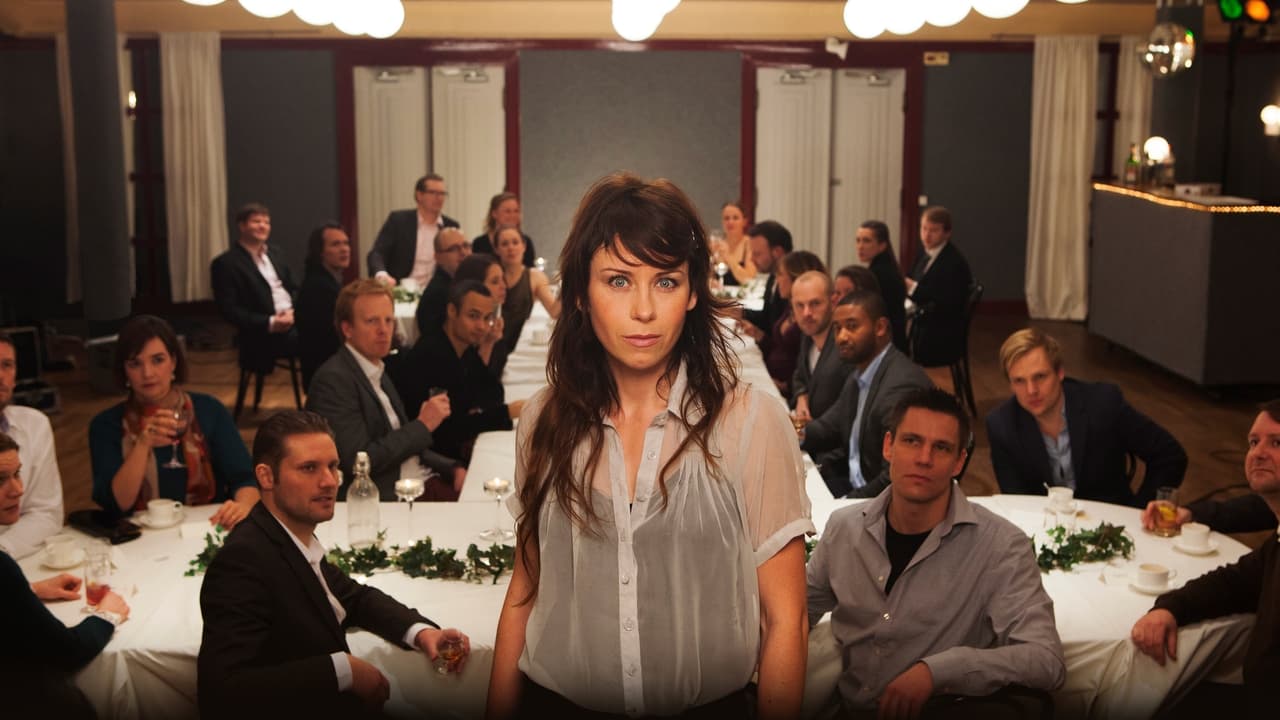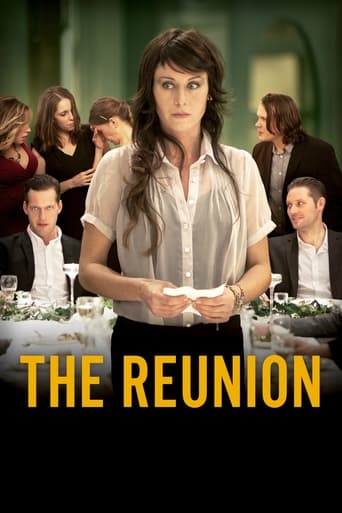Dorathen
Better Late Then Never
StyleSk8r
At first rather annoying in its heavy emphasis on reenactments, this movie ultimately proves fascinating, simply because the complicated, highly dramatic tale it tells still almost defies belief.
filippaberry84
I think this is a new genre that they're all sort of working their way through it and haven't got all the kinks worked out yet but it's a genre that works for me.
Neive Bellamy
Excellent and certainly provocative... If nothing else, the film is a real conversation starter.
maxwicen-348-369319
So this is a revenge flick basically. But instead of blood and gore, you'll get awkward scenes with the antagonist and the protagonists. It kind of feels like when people get in their mid 30s and 50s they completely forget how children think and act. And all bullying is because the children are malevolent and evil.This is one of those movies where it's not clear if the main character is really the hero, or if she is actually the villain. Using her newfound power -she now being a successful filmmaker. To take revenge on people that had unintentionally hurt her in the past.The movie is so incredibly passive aggressive it's just mind blowing. And the storytelling is so incredibly one sided - her perspective of all the events that were bad in her childhood. She has zero empathy for her classmates as an adult, which is probably why she had no friends as a child.But because this movie is about bullying, everyone must rate it super high. It deserves 3 stars out of 10, and that's for successful awkward scenes.
JvH48
I saw this film at the Rotterdam film festival 2014 (IFFR). It is divided in two very distinct parts. The first half shows a reunion party where school mates meet again after 20 years. Our main character, though not invited, holds a strong speech about bullying and shunning, and how it haunted her for the past 20 years. It is not clear upfront that the reunion party, with all ugly details touched upon during our main character's speech, is an art project with a specific purpose leading to the second half of this film. The latter fact is revealed later on, also letting us know that all party-goers (except herself) were actors. For a long time you think it is all for real, and you feel very uneasy when watching it. Her initial speech is only the beginning, yet the least problematic in comparison. It gets much worse when others at the party react on her speech, and she forcefully rebuts all remarks. Eventually, she is thrown out. We can only assume that the happy atmosphere was destroyed for good after she was gone. Alas, it solves nothing, and if this was all that this movie had to offer, we would be inclined to ask our money back.Luckily, the ultimate purpose of the staged reunion party becomes clear in the second half. It makes this film really interesting, setting it apart from many other movies about the same topic. She approaches several of her real (not the actors) former class mates, to show them the film that recorded the fictitious reunion party, and to talk about it individually within the confines of her home. Many class mates invent all sorts of excuses and don't show up, while some of them do appear and are surprised to see her view on what happened 20 years ago. She even made a visual diagram of a "class hierarchy", showing herself at the lowest level, as a means to illustrate her evaluation of the situation back then. She also went at considerable length to contact some of the unwilling non-responders, even to approach them on their workplace or at their front door, in order to confront them with their common past. It leads to interesting discussions, all of those proving her point that each of them experienced said past very differently.All in all, my strong feelings of "I'd rather not be here" embarrassment was comparable with seeing Seidl's Hundstage or the more recent "Paradise" trilogy. That applies to the first half (the staged party) as well as the second half (confronting her former class mates). Yet I think that the second half might have achieved a more balanced effect when she had succeeded in getting to appear some of the more accomplished types (in the eyes of their peers), in other words those deemed at the top of the class hierarchy and successful in today's life too. In the first half we saw several who we can assume in that category. When thinking along that line, I got stuck with a feeling of some missed chances for a better end result. Still, a wonderful film with an original twist on the subject. It ranked 32th (out of 200) for the audience award with average score 4.238 (out of 5).
stensson
It's a not so uncommon movie subject, this one about reunions which become life-changing drama. But Anna Odel's version is shakening. She meets her old class after 20 years and gives a speech. It's about hierarchies, power, games and one of the greatest sadist joys: Falsely making somebody believe you're in love with her.The first half of the film tells about the party, which is a humiliating disaster for Anna. In the second part, she confronts some persons from the class. What's the greatest bully victory? Making someone feel she wasn't bullied at all.It's not a perfect film, but one you will remember if you have any experience at all of hierarchies in school and other places.
stephanlinsenhoff
Anna Odells first movie 'The Reunion' goes up today, 15 November 2013. In Sweden. Already she received two awards and more will follow. But she will have to pay for this controversially (the ambivalent reactions waiting around the corner) film: in focus her experience in school. Uninvited she comes (too late) to the party of reunion. The one who arranged welcomes everybody: "Great that so many have come. Cheers!" Anna interrupts: reminding them all what they did to her and with her. She was the Nobody and had to be. In every group is a container for the bad things: "A daily battle. Not revenge but to tell today what I could not tell yesterday. I was the one who was pushed, beaten, laughed at, not looked at and not seen." And it happens again: interrupted in her speech. The same for the No-body today. Chaos.She is by far not alone with this experience, called mobbing. Yesterday, today, Tmorrow. Many of us have to live with it, unable to defend us. Laughed at. Unseen. The object for shame. Not one of the crowd Not In- but Out-side, beside the group. Qietly suffering for what they are and never can be. How react? As Anna Odell? It took courage to come late and cross (not for the first time) the forbidden line everybody accepts and respects? Today not as art performance but the actor and director.The setup are two parts, the second as documentary. When she planned the idea, she asked her former class if they want to take 'their' part in this reality-movie. They denied. Of course. Actors took their place. How will the real people of her class from yesterday, today adults, react that actors took their part? To be in public forced to look into the mirror is everything but not easy. For Anna Odell it does not matter, what ever the reactions. The Nobody she is for them. She has nothing to loose. The movie reminds not only of the speech in the Danish Dogma 1 movie 'The Celebration', 1998, Thomas Vinterberg but also of Gina's speech in The Girl in the Café, 2005. Even them had nothing to loose, knowing what happens after their speech.Change? Nothing will change. For many this (in front) mirror can be a reminder of our society: in school and today at work. Change? Perhaps by small islands. Those small islands amidst of the daily battle, that Slavoj Zizek describes as 'spaces'. Not left-right, black-white but by the unrecognized and unseen 'Between' as possibility: our responsibility. ............... ...............................Return 2014-10-11 Som years have passed. At that time I hired the movie, keen to see it as it washighlighted by many and in the media. Now I bought the DVD to see itnot in a haste. I even re saw again Thomas Vinterbergs 'TheCelebration'. I still believe that this movie is so much better, sorough and true as Anna Odells, she must have seen it, bleak copy. Shewanted and pulled back. BUT: the reason why i return: she should have had the courage to go beyond. More. Out to infinity and return on the other side. THEN most of us should have be happy. More. With this action she could have handled a for us important issue different. Objectivly "and" personally. She asked her former class to take their part. They refused. Actors took their part. I wondered if some of them made a police issue of it as they all where drawn into the light. But it did not happen. Why? Answer 1. They where afraid that more by a trial should surface Answer 2. They did not care

